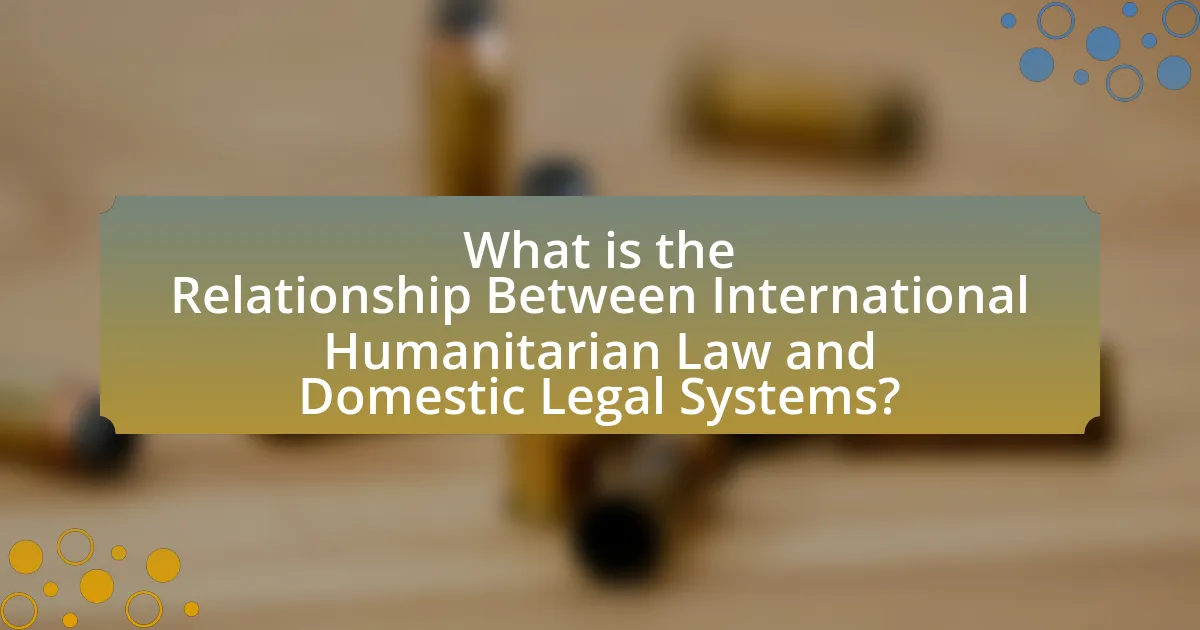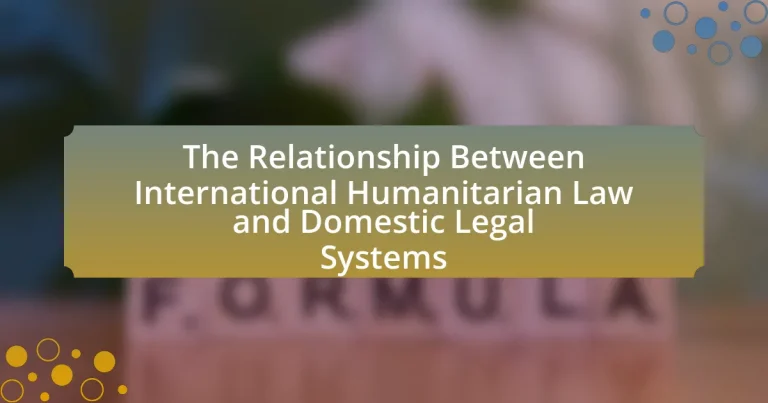The article examines the relationship between International Humanitarian Law (IHL) and domestic legal systems, highlighting how IHL sets standards for armed conflict that must be integrated into national legislation. It discusses the mechanisms through which domestic laws incorporate IHL principles, such as distinction, proportionality, and necessity, and emphasizes the importance of this relationship for ensuring accountability for war crimes and protecting human rights. The article also addresses challenges in harmonizing IHL with domestic laws, including issues of state sovereignty and differing legal interpretations, while outlining best practices for improving compliance and the role of legal education in this process.

What is the Relationship Between International Humanitarian Law and Domestic Legal Systems?
International Humanitarian Law (IHL) and domestic legal systems are interconnected, as IHL sets standards for the conduct of armed conflict that domestic laws must incorporate and enforce. States are obligated to implement IHL through their national legislation, ensuring compliance with international treaties such as the Geneva Conventions. For instance, Article 1 of the Geneva Conventions mandates that states must respect and ensure respect for the conventions in all circumstances, which necessitates the integration of IHL principles into domestic law. This relationship is further evidenced by the fact that many countries have enacted specific laws to address war crimes and other violations of IHL, thereby reinforcing the applicability of international norms within their legal frameworks.
How does International Humanitarian Law interact with domestic laws?
International Humanitarian Law (IHL) interacts with domestic laws primarily through incorporation and implementation mechanisms. States are obligated to integrate IHL into their national legal frameworks, ensuring compliance with international standards during armed conflicts. For instance, many countries adopt specific legislation that aligns with the Geneva Conventions, which govern the conduct of war and the protection of individuals. This incorporation is essential for the enforcement of IHL at the national level, as seen in countries like Germany and Canada, where domestic laws explicitly reference IHL principles. Furthermore, domestic courts may apply IHL when adjudicating cases related to war crimes or humanitarian violations, reinforcing the relationship between international obligations and national legal systems.
What are the key principles of International Humanitarian Law?
The key principles of International Humanitarian Law (IHL) are distinction, proportionality, and necessity. Distinction mandates that parties in a conflict must differentiate between combatants and civilians, ensuring that attacks are directed only at military targets. Proportionality prohibits attacks that would cause excessive civilian harm in relation to the anticipated military advantage. Necessity allows for the use of force only when it is essential to achieve a legitimate military objective. These principles are enshrined in treaties such as the Geneva Conventions and are fundamental to protecting human rights during armed conflicts.
How do domestic legal systems incorporate these principles?
Domestic legal systems incorporate principles of international humanitarian law (IHL) through various mechanisms, including legislation, judicial decisions, and administrative practices. For instance, many countries enact specific laws that align with IHL, such as the Geneva Conventions, which are often integrated into national legal frameworks. Additionally, courts may interpret domestic laws in light of IHL, ensuring that international obligations are upheld in legal proceedings. Countries like Germany and Canada have demonstrated this incorporation by adopting laws that explicitly reference IHL principles, thereby reinforcing their commitment to international standards.
Why is the relationship between International Humanitarian Law and domestic legal systems important?
The relationship between International Humanitarian Law (IHL) and domestic legal systems is important because it ensures the effective implementation and enforcement of humanitarian principles within national jurisdictions. This relationship facilitates the incorporation of IHL into domestic laws, allowing states to uphold their obligations under international treaties, such as the Geneva Conventions, which mandate the protection of individuals during armed conflicts. Furthermore, domestic legal systems provide mechanisms for accountability, enabling the prosecution of war crimes and violations of IHL, thereby reinforcing the rule of law and promoting justice. For instance, countries like Germany and the United States have integrated IHL into their legal frameworks, allowing for the prosecution of individuals for war crimes committed abroad, demonstrating the critical role of domestic systems in enforcing international standards.
What are the implications for human rights protection?
The implications for human rights protection are significant, as the interplay between international humanitarian law (IHL) and domestic legal systems can either enhance or undermine the enforcement of human rights. When domestic laws align with IHL, they can provide a robust framework for protecting individual rights during armed conflicts, ensuring accountability for violations. For instance, the incorporation of IHL principles into national legislation can lead to stronger legal mechanisms for prosecuting war crimes, thereby reinforcing human rights protections. Conversely, if domestic laws conflict with IHL or lack adequate enforcement mechanisms, this can result in gaps in protection, allowing human rights abuses to occur without accountability. Historical examples, such as the prosecution of war crimes in the International Criminal Tribunal for the former Yugoslavia, illustrate how adherence to IHL can lead to improved human rights outcomes.
How does this relationship affect accountability for war crimes?
The relationship between international humanitarian law and domestic legal systems significantly affects accountability for war crimes by establishing a framework for prosecution and enforcement. This relationship allows international legal standards to influence national laws, compelling states to incorporate provisions that facilitate the prosecution of war crimes within their jurisdictions. For instance, the principle of universal jurisdiction enables states to prosecute individuals for war crimes regardless of where the crime occurred, as seen in cases like the prosecution of former Chilean dictator Augusto Pinochet in Spain. This integration of international norms into domestic legal systems enhances the likelihood of accountability, as it provides legal mechanisms for victims to seek justice and for states to fulfill their obligations under international treaties, such as the Geneva Conventions.

What challenges exist in the relationship between International Humanitarian Law and domestic legal systems?
The primary challenge in the relationship between International Humanitarian Law (IHL) and domestic legal systems is the inconsistency in legal frameworks and enforcement mechanisms. Domestic legal systems may not fully incorporate IHL principles, leading to gaps in protection and accountability during armed conflicts. For instance, many countries lack specific legislation that aligns with IHL, resulting in inadequate prosecution of war crimes. Additionally, the principle of state sovereignty can hinder the enforcement of international norms, as states may prioritize national laws over international obligations. This dissonance can lead to impunity for violations of IHL, undermining the effectiveness of international legal standards.
What are the common conflicts between international and domestic laws?
Common conflicts between international and domestic laws arise primarily from differences in legal obligations, enforcement mechanisms, and interpretations of human rights. For instance, a country may ratify an international treaty that mandates certain human rights protections, but its domestic laws may not align with these obligations, leading to conflicts in implementation. Additionally, domestic courts may prioritize national laws over international treaties, resulting in situations where individuals cannot seek redress for violations of international standards. A notable example is the U.S. Supreme Court’s decision in Medellin v. Texas (2008), where the Court ruled that international treaties do not automatically have domestic legal effect unless implemented by Congress, highlighting the tension between international commitments and domestic legal frameworks.
How do differing interpretations of laws create challenges?
Differing interpretations of laws create challenges by leading to inconsistencies in legal applications and enforcement. For instance, when international humanitarian law is interpreted differently by various domestic legal systems, it can result in conflicting legal standards and practices. This inconsistency can hinder cooperation between states, complicate the prosecution of war crimes, and create uncertainty for individuals seeking justice. A notable example is the varying interpretations of the Geneva Conventions, where some countries may prioritize national security over humanitarian obligations, leading to divergent legal outcomes in similar situations. Such discrepancies can undermine the effectiveness of international legal frameworks and erode trust among nations.
What role does state sovereignty play in these conflicts?
State sovereignty plays a critical role in conflicts by determining the extent to which a state can exercise control over its territory and population, often leading to tensions between national interests and international humanitarian law. In many cases, states assert their sovereignty to resist external intervention, even when such intervention may be necessary to protect human rights or address humanitarian crises. For example, the principle of non-interference in domestic affairs is frequently invoked by states to justify actions that may violate international humanitarian standards, as seen in the Syrian conflict where the government has resisted foreign involvement despite widespread human rights abuses. This dynamic illustrates how state sovereignty can hinder the enforcement of international humanitarian law, as states prioritize their autonomy over compliance with global norms.
How do domestic courts address issues related to International Humanitarian Law?
Domestic courts address issues related to International Humanitarian Law (IHL) by interpreting and applying IHL principles within their national legal frameworks. Courts often rely on domestic legislation that incorporates IHL, such as statutes that criminalize war crimes or provide for the prosecution of individuals for violations of IHL. For instance, in cases like the International Criminal Tribunal for the former Yugoslavia, domestic courts have utilized IHL to adjudicate war crimes, demonstrating the integration of international norms into national legal systems. Additionally, domestic courts may refer to international treaties and customary international law to inform their decisions, ensuring compliance with IHL obligations. This practice underscores the role of domestic courts in upholding international standards while navigating their legal systems.
What are the limitations faced by domestic courts in enforcing international norms?
Domestic courts face several limitations in enforcing international norms, primarily due to issues of jurisdiction, lack of legal framework, and conflicting national laws. Jurisdictional limitations arise when domestic courts lack the authority to adjudicate cases involving international norms, especially if those norms are not incorporated into national law. Additionally, many countries do not have a comprehensive legal framework that explicitly recognizes or implements international norms, leading to challenges in enforcement. Conflicting national laws can also hinder the application of international norms, as domestic legal systems may prioritize national legislation over international obligations. These limitations are evident in cases where domestic courts have been unable to hold individuals accountable for violations of international humanitarian law due to these barriers.
How do judicial decisions impact the application of International Humanitarian Law?
Judicial decisions significantly impact the application of International Humanitarian Law (IHL) by interpreting and enforcing legal standards within domestic legal systems. Courts often rely on precedents set by international tribunals, such as the International Criminal Court, which clarify the obligations of states and individuals under IHL. For instance, the landmark case of Prosecutor v. Tadic established the applicability of IHL in non-international armed conflicts, influencing national courts to adopt similar interpretations in their jurisdictions. This judicial engagement ensures that IHL is not only recognized but also integrated into domestic legal frameworks, thereby enhancing accountability and compliance with international standards.

What are the best practices for harmonizing International Humanitarian Law with domestic legal systems?
The best practices for harmonizing International Humanitarian Law (IHL) with domestic legal systems include the incorporation of IHL principles into national legislation, training legal professionals and military personnel on IHL, and establishing mechanisms for accountability and enforcement. Incorporating IHL into national legislation ensures that domestic laws reflect international obligations, as seen in countries like Canada, which has integrated IHL into its Criminal Code. Training programs for legal professionals and military personnel enhance understanding and compliance with IHL, as demonstrated by the International Committee of the Red Cross’s training initiatives. Establishing accountability mechanisms, such as war crimes tribunals, reinforces adherence to IHL, evidenced by the establishment of the International Criminal Court, which prosecutes violations of IHL. These practices collectively strengthen the alignment of domestic legal frameworks with international humanitarian standards.
How can states improve the incorporation of International Humanitarian Law into domestic legislation?
States can improve the incorporation of International Humanitarian Law (IHL) into domestic legislation by enacting specific laws that align with IHL principles and ensuring comprehensive training for legal and military personnel. This alignment can be achieved through the adoption of national legislation that explicitly references IHL treaties, such as the Geneva Conventions, thereby creating a legal framework that mandates compliance. Furthermore, states should implement educational programs for military and civilian officials to enhance understanding of IHL, as evidenced by the International Committee of the Red Cross’s findings that effective training significantly increases adherence to humanitarian norms during conflicts.
What role do legal education and training play in this process?
Legal education and training are essential in bridging the gap between international humanitarian law (IHL) and domestic legal systems. They equip legal professionals with the knowledge and skills necessary to interpret, apply, and enforce IHL within their national jurisdictions. This education fosters an understanding of the obligations and rights established by IHL, ensuring that legal practitioners can effectively advocate for compliance and accountability in domestic courts. Furthermore, training programs often include practical simulations and case studies that illustrate the application of IHL, reinforcing its relevance in real-world scenarios. By enhancing the capacity of legal professionals, legal education and training play a crucial role in integrating IHL into domestic legal frameworks, ultimately promoting adherence to international standards.
How can collaboration between international and domestic legal entities enhance compliance?
Collaboration between international and domestic legal entities enhances compliance by creating a cohesive framework that aligns international humanitarian law with local legal systems. This alignment facilitates the sharing of best practices, resources, and expertise, which strengthens the enforcement of laws and regulations. For instance, when domestic legal entities work with international organizations, they can adopt standardized procedures that reflect global norms, thereby improving their ability to address violations effectively. Additionally, joint training programs and workshops can increase awareness and understanding of international obligations among domestic legal practitioners, leading to more consistent application of the law. This collaborative approach has been shown to improve compliance rates, as evidenced by various case studies where countries that engaged in such partnerships reported a decrease in violations of humanitarian law.
What resources are available for legal practitioners working at the intersection of these laws?
Legal practitioners working at the intersection of international humanitarian law and domestic legal systems can access various resources, including specialized legal databases, scholarly articles, and professional organizations. Legal databases such as Westlaw and LexisNexis provide comprehensive access to case law, statutes, and legal commentary relevant to both international and domestic legal frameworks. Scholarly articles published in journals like the International Review of the Red Cross offer in-depth analyses and case studies that illuminate the practical application of these laws. Additionally, organizations such as the International Committee of the Red Cross and the American Society of International Law provide resources, training, and networking opportunities for legal professionals navigating these complex legal landscapes.
What are the key organizations and treaties that support this harmonization?
The key organizations that support the harmonization of international humanitarian law (IHL) with domestic legal systems include the International Committee of the Red Cross (ICRC) and the United Nations (UN). The ICRC plays a crucial role in promoting and ensuring compliance with IHL, while the UN facilitates international cooperation and the implementation of humanitarian principles through various agencies and resolutions.
Key treaties that support this harmonization include the Geneva Conventions of 1949 and their Additional Protocols, which establish the legal framework for the protection of individuals during armed conflicts. These treaties are universally ratified, demonstrating widespread acceptance and commitment to IHL principles by states. Additionally, the Rome Statute of the International Criminal Court (ICC) reinforces the enforcement of IHL by establishing accountability for war crimes and crimes against humanity.
How can practitioners stay informed about developments in International Humanitarian Law?
Practitioners can stay informed about developments in International Humanitarian Law (IHL) by regularly engaging with specialized legal journals, attending relevant conferences, and participating in training programs. Legal journals such as the International Review of the Red Cross publish articles on recent IHL developments, while conferences organized by entities like the International Committee of the Red Cross provide updates and networking opportunities. Additionally, training programs offered by universities and organizations focused on IHL ensure practitioners are aware of the latest legal frameworks and case law. These resources collectively enhance practitioners’ understanding and application of IHL in various contexts.


